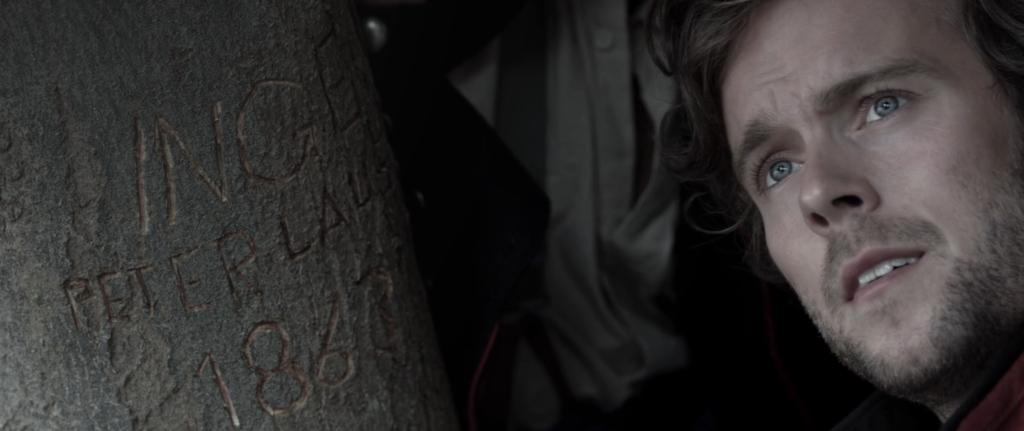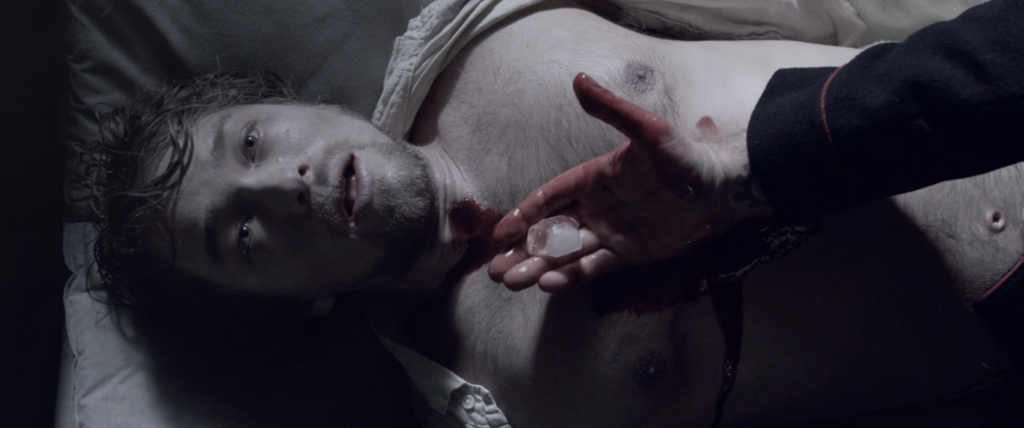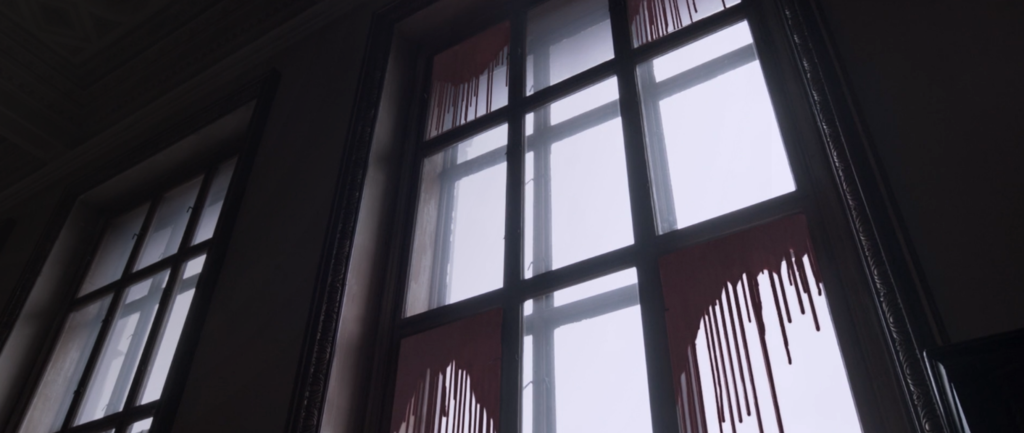
Peter (Soren Saetter-Lassen) memorializes his pastoral haven with Laust and Inge, before indulging in war. 1864 (MHZ, 2017)
Apart from charting the deep, psychological trials of war, granted with such humanistic sensitivity, Ole Bornedal’s ambitious portrayal of the Second Schleswig War of 1864 between Denmark and Prussia is truly an exhortation for both historical reverence and remembrance. As 1864 explores interweaving narratives surrounding its eponymous title, it also presents a complementary, modern perspective. The contemporary figure Claudia (Sarah-Sofie Boussnina) comes to discover and gain appreciation for Denmark’s tumultuous and intimate lineage through the elderly local Baron Severin (Bent Meiding). A lineage, both national and familial, through which she discovers her own roots. Far from fetishizing violence or divulging in pandering dramaticism, 1864 displays an expressively personal, multifaceted portrait of the lives of many Danes, forged and leveled by the shadows of war. This deeply investigative narrative aptly stretches over a century and a half, thus exhibiting an innate thread between history and today.
One of 1864’s great highlights stems from its temporal structure and inventive use of flash-forwards. In the opening moments of the inaugural episode, Inge (Marie Tourell Søderberg) delivers the first of many touching narrations, which not only chart the diegetic events of the serial, but touchingly reveal the emotional bearings of each player, thus showcasing a deep sense of understanding to accompany her omniscient retrospective. And in this opening dialogue, Bornedal interpolates various future moments to come throughout the series, teasing a lush visual palette of diegetic intrigue. The use of Inge’s narrations decisively bookends each episode with a flourish of flashbacks and flash-forwards. The beginning of each episode (apart from the first) recalls past events in a visual flurry that sweeps along, ushered by Inge’s tender words; whereas each end presents a spread of subsequent moments, replacing Inge’s narration with the beautifully stirring score by composer Marco Beltrami. Matched with images both harsh and consoling, Beltrami’s theme for 1864 closes each episode’s flash-forward sequence with light touches of piano keys, gradually building alongside horns, strings, and percussive orchestration. While instilling emotive sensations with the shared sequence of imagery, Beltrami’s music fashions rousing notes of both celebration and elegy. But perhaps most perceptively, the score inherently memorializes the images, thus reinforcing notions of remembrance, as Inge’s journalistic account is traced through the generations, bridging the timelines from the nineteenth century to the modern setting with Claudia and Severin.

A moment of mystical healing between Laust (Jakob Oftebro) and Johan (Soren Malling). 1864 (MHZ, 2017)
As mentioned, the majority of 1864 is situated in nineteenth-century Denmark, touching on the lives of young brothers Peter and Laust Jensen (Benjamin Holmstrom Neilson and Sylvester Byder, respectively) following the return of their father (Lars Mikkelson) from the Danish-won First Schleswig War. It is during this time that they also meet the young Inge (Fanny Bornedal), who is the pivotal shaping figure throughout the series. Though father Jensen returns from the war physically wounded, it is the local baron’s son Didrich (Pilou Asbaek) whose wounds are innately psychological, and his internal traumas from the war ultimately strip away an ostensible nobility, as his mental sanity continually degrades over the course of the series and he comes to embody the primary villainous figure. Inge notes this in two of her early dialogues by saying, “Not many people saw the scars on Didrich’s soul …. Like Peter and Laust’s father, he’d come home from the war a victor. He with wounds on his soul. Father, with one on his leg.” His eventual malapropos interest in Inge, even at her young age, stems not from direct pedophilic interest, but rather because she sees through his internal pains, genuinely offering him understanding and empathy. And though Didrich latches onto to Inge, thus informing his ongoing baleful behavior, it is inherently the nature of war which contextualizes the psychology of himself and each of the other Danes. As for Didrich, his traumas were met with a young Inge’s kindness, which he overindulged in and exploited, thus spurning a cluster of reactionary measures shaping the lives of each character as they grew older and experienced the sufferings of war for themselves. For the adult Inge, along with Peter and Laust (Jens Saetter-Lassen and Jakob Oftebro, respectively) their own lives become disassembled and reconstructed through their experiential endeavors in the Second Schleswig War. As such, war-born trauma remains the configuring and conscious theme for 1864.

Expressionist imagery during Bishop Monrad’s (Nicholas Bro) emphatic speech on preemptive war. 1864 (MHZ, 2017)
As Claudia is shaped by the death of her own brother during an undisclosed modern war, her rebellious behavior and marginalization eventually lead her to care for Severin, during which time they grew fond of one another, sharing in Inge’s journals of not just her own experiences, but those of Peter and Laust, Didrich, nativist politician Bishop Monrad (Nicholas Bro), gypsy immigrant Sofia (Eva Josefikova), Prussian soldier Heinz (Ludwig Trepte), and countless other victims and instigators of war. While the series largely focuses on the Second Schleswig War, Bornedal shifts between various timelines, noting the confluence of past and present as Claudia and Severin account for their history, discovering themselves to be heirs to the stories unveiled. As these tragedies manifest, Bornedal reveals a multifaceted, at times even mythic, take on this war. He also presents a complementary Prussian perspective, offering viewpoints from high officials such as General Prince Friedrich Karl (Barnaby Metschurat), and idealistic (even pacifist) infantrymen like Heinz, whose core personality completely shifts during the course of conflict, shaken and enraged by trauma. And in spite of agitated figures and congenial men, comme Peter, broken and hardened by war, there are some characters who embody traits forged by war, but also that transcend it. Most notably Peter, Laust, and Didrich meet solider Johan Larsen (Soren Malling), who is arguably the most alluring, perplexing figure in the series. As veteran of the First Schleswig War, like Didrich, Johan is attuned to the context of battle, and strives to forewarn and tend to the initial naivety of his fellow Danish soldiers, all with relative calm. His own perception affords a rather mystical precognition during select moments and Johan distinctly stands apart as a guiding secretive figure, informed by his own mysteries of war. His own role becomes pivotal in shaping the aftermath of the war.
As a multilayered, perceptive display of history and the psychological resonance of war, 1864 serves not only to account for the harrowing chronicles of war, but also to delineate the threads that relate history to our own contemporary lives. By furnishing multiple experiential accounts in 1864, Bornedal interlaces several narratives and thematic lines within his series, in order to comprehensively showcase the interconnectivity of historical and personal narratives. Thus, 1864 essentially exhibits how our past continually contextualizes the present, by having Inge’s stories imbue and contextualize the lives of Severin and Claudia. As extensions of the past, Inge’s narrative accounts are affixed to the present, through elucidation and progeny.
In pursuit of this ambitious project, Bornedal has since highlighted the difficulties in managing the high production costs, adjusting to capricious weather conditions, along with logistical challenges in handling the hundreds of on-set extras needed for the battle scenes (Arth). Bornedal even touched on the need for government funding in fully securing the project, noting a general rarity for historical dramas in Scandinavia. In his interview with the American television broadcasting company MHZ, Bornedal also shared his own thoughts on his epic drama, stating, “It’s a classic story about power and the abuse of power and of people getting separated” (Barraclough). And as the fatal realities of each character unfold at the close of the series, tragedy shifts toward acceptance and a resolve to bear the scars of war, but nevertheless to live on. Back in his home village, with his remaining family members and companions seated around the table, Peter delivers one final poignant address, in which he charges everyone to endure, acknowledging what is innately joyful and good in life. Not to forget the traumas of war which mark each person, but cultivate a life to be lived fully, earnestly, and to take solace in everything good that remains. As their lives continue, and Sofia and Inge bear children of their own, the direct lineage of these events is revealed through Claudia and Severin as they share in Inge’s principal memoirs.
In 1864, Bornedal weaves a number of narratives which each encompass the effects of war, both nationally and personally. And while the entirety of his story could have benefited with more focus on Claudia and Severin in the final episode, in addition to the gypsy players (which are curiously sidelined during the second half of the series), 1864 presents an immensely evocative and memorable chronicle of the impacts of trauma. Such modes of war-time trauma contextualize and shape each Dane discretely, while also bridging a greater national history, and unifying Denmark through a shared lineage of its history, both in its devastation and camaraderie. In crafting such a piece, Ole Bornedal charges his viewers to remember our ancestral past and how it shapes us today. From which they may better understand and appreciate the scars of their ancestral souls and the future of their own. Currently, the series is available on the streaming platform Mhz Choice, noted for its distribution of international media.
References
Arth, Chris. “Interview with ‘1864’ Director Ole Bornedal.” Mhzblog, 9 Sept. 2017. Web. 11 July 2018. <https://mhzchoiceblog.com/interview-1864-director-ole-bornedal/>.
Barraclough, Leo. “Danish Epic Wins Funding War.” Variety 321.10 (2013): 56-57. EBSCOhost. Web. 11 July 2018.
Author Biography
Matthew Johnson is a student at the University of North Carolina studying film and French language. He hopes to pursue a career in critical writing, and plans on continuing his studies at the graduate level. Along with an ardor for world cinema, he enjoys spending majority of his time outdoors, namely backpacking.








































